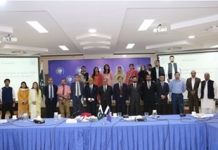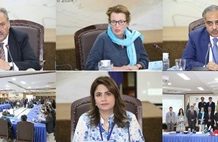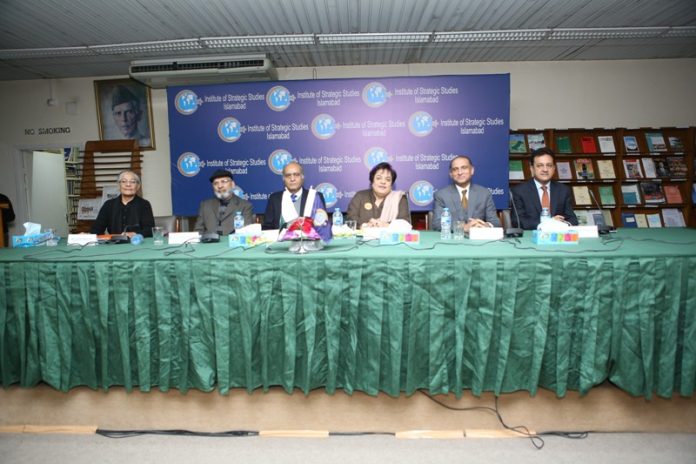Press Release
Public Talk
Human Rights Violations in Indian Occupied Kashmir
December 10, 2018
“Pakistan needs to keep re-emphasizing the fact that when India took the Kashmir issue to the United Nations, it did not cite Pakistan as a transgressor. Sideways, we need to move beyond the rhetoric we are addicted to. Too many Kashmiris have died and too many generations have been lost”. This was stated by Honorable Dr. Shireen M. Mazari, Federal Minister for Human Rights during her address as Chief Guest at a Public Talk on “Human Rights Violations in Indian Occupied Kashmir”, organized by the Institute of Strategic Studies Islamabad (ISSI) today under its Distinguished Lecture Series. The event coincided with the celebrations marking International Human Rights Day which signifies the adoption of the Universal Declaration of Human Rights by the UN General Assembly in 1948.
Other speakers on the occasion included: Mr. Ghulam Muhammad Safi, Convener All Parties Hurriyat Conference (APHC); Ms. Tahira Abdullah, Human Rights Activist and Mr. Sardar Amjad Yousaf Khan, Executive Director, Kashmir Institute of International Relations (KIIR).
Dr. Mazari said presently, the violation by Indian forces have broken all bounds. Never before were women and children targeted with pellet guns or dragged along the streets of Srinagar she said. She lamented that the Pakistani Government should have allowed a committee to investigate the Pakistani side of Kashmir. She labeled this as a major blunder. Outlining the path that the Pakistani Government should adopt, she said that in line with the United Nations Human Rights Council (UNHRC) Report – a major development in itself – Islamabad needs to establish an inquiry commission on an urgent basis. An area which has been neglected is the abuse and violence against women in Indian Occupied Kashmir, and international women organizations need to be approached in this regard. She cited the principles underlying the Good Friday Agreement as valid for the Kashmir issue, namely, the principle of self determination, de-weaponization following an agreement, and two separate parallel agreements: one between India and Pakistan and one between Pakistan, India and all other stakeholders involved. Sideways, she also pointed out how the Indian government is trying to change the demography of Kashmir, and if successful, this would destroy the whole concept of having a plebiscite.
The main points raised by the speakers were that Kashmiris have the same rights as other people the world over, hence all authorities must respect this. Moreover, the UNHRC Report on Kashmir urges that this matter be discussed at all fora. The office of the UNHRC is unambiguously clear that the violations are structural in nature. In order for Pakistan to retain a moral high ground, two things should be taken note of. Firstly, the UNHRC report has pointed out that there are problems in the Pakistan Administered Kashmir such as curbs on the freedom of expression. Secondly, the voices of Kashmiri women are not heard. Both issues need to rectified immediately. All the speakers also agreed that any negotiation should be trilateral in nature and should be inclusive of Kashmiri participation. Pakistan should not be hesitant in reiterating the UNSC resolutions on Kashmir – any solution must have the UNSC resolutions as the central principle always.
Earlier, in his welcome remarks, Director General ISSI, Ambassador (Retd) Aizaz Ahmad Chaudhry said that even though great strides have been made, a lot more ground needs to be covered where human rights are concerned. Seven decades have passed since the international community promised and failed to deliver the right of self-determination to the Kashmiri people. The last few years have been particularly hard on the Kashmiris – the use of pellet guns to blind hundreds of men and women is particularly brutal. “What hurts Kashmiris hurts us”, he said
In his concluding remarks, Chairman BOG ISSI, Ambassador (Retd) Khalid Mahmood said that in Kashmir, human rights are at stake. It is only recently, after the publication of the UHRC Report that there is now a growing awareness. The main objective is to put an end to this struggle spanning over the last seventy years , which has only brought misery to the Kashmiri people. The main role has been played by the people of Kashmir themselves. Though Pakistan has been trying to keep the issue alive, in essence, it is the sacrifices of the Kashmiris that has kept the issue alive. Moreover, while we await the political solution of the problem, the aspect of human rights must not be forgotten.












